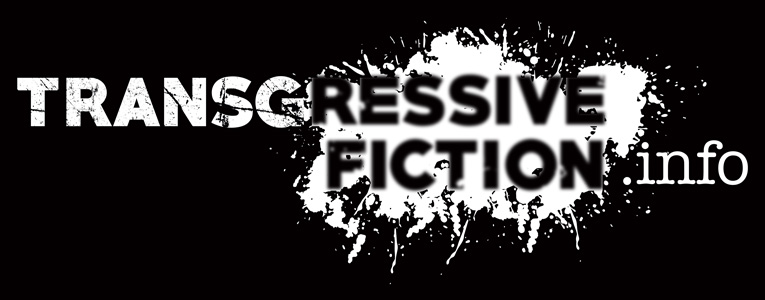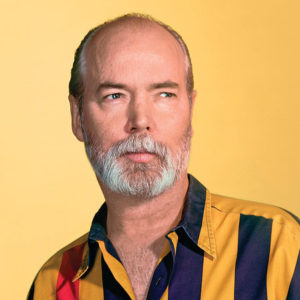 Douglas Coupland is Canadian, born on a Canadian Air Force base near Baden-Baden, Germany, on December 30, 1961. In 1965 his family moved to Vancouver, Canada, where he continues to live and work. Coupland has studied art and design in Vancouver, Canada, Milan, Italy and Sapporo, Japan. His first novel, Generation X was published in March of 1991. Since then he has published nine novels and several non-fiction books in 35 languages and most countries on earth. He has written and performed for the Royal Shakespeare Company in Stratford, England, and in 2001 resumed his practice as a visual artist, with exhibitions in spaces in North America, Europe and Asia. 2006 marks the premiere of the feature film Everything’s Gone Green, his first story written specifically for the screen and not adapted from any previous work. A TV series (13 one-hour episodes) based on his novel, JPod premiered on the CBC in January, 2008.
Douglas Coupland is Canadian, born on a Canadian Air Force base near Baden-Baden, Germany, on December 30, 1961. In 1965 his family moved to Vancouver, Canada, where he continues to live and work. Coupland has studied art and design in Vancouver, Canada, Milan, Italy and Sapporo, Japan. His first novel, Generation X was published in March of 1991. Since then he has published nine novels and several non-fiction books in 35 languages and most countries on earth. He has written and performed for the Royal Shakespeare Company in Stratford, England, and in 2001 resumed his practice as a visual artist, with exhibitions in spaces in North America, Europe and Asia. 2006 marks the premiere of the feature film Everything’s Gone Green, his first story written specifically for the screen and not adapted from any previous work. A TV series (13 one-hour episodes) based on his novel, JPod premiered on the CBC in January, 2008.
Books
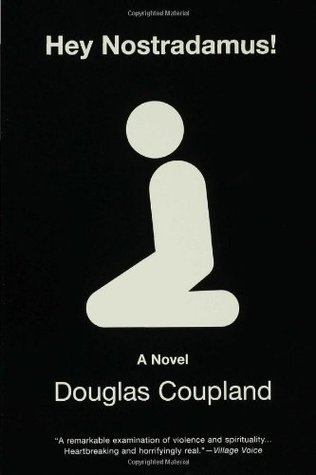
Hey Nostradamus!
Pregnant and secretly married, Cheryl Anway scribbles what becomes her last will and testament on a school binder shortly before a rampaging trio of misfit classmates gun her down in a high school cafeteria. Overrun with paranoia, teenage angst, and religious zeal in the massacre’s wake, this sleepy suburban neighborhood declares its saints, brands its demons, and moves on. But for a handful of people still reeling from that horrific day, life remains permanently derailed. Four dramatically different characters tell their stories: Cheryl, who calmly narrates her own death; Jason, the boy no one knew was her husband, still marooned ten years later by his loss; Heather, the woman trying to love the shattered Jason; and Jason’s father, Reg, whose rigid religiosity has separated him from nearly everyone he loves. Hey Nostradamus! is an unforgettable portrait of people wrestling with spirituality and with sorrow and its acceptance.
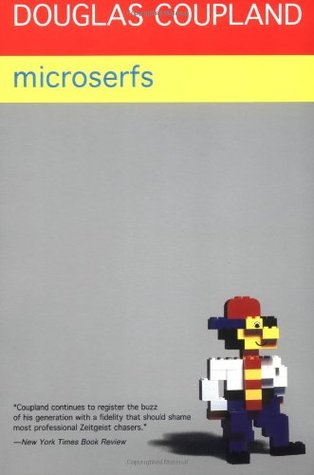
Microserfs
Narrated in the form of a Powerbook entry by Dan Underwood, a computer programmer for Microsoft, this state-of-the-art novel about life in the ’90s follows the adventures of six code-crunching computer whizzes. Known as “microserfs,” they spend upward of 16 hours a day “coding” (writing software) as they eat “flat” foods (such as Kraft singles, which can be passed underneath closed doors) and fearfully scan the company email to see what the great Bill might be thinking and whether he is going to “flame” one of them. Seizing the chance to be innovators instead of cogs in the Microsoft machine, this intrepid bunch strike out on their own to form a high-tech start-up company named Oop! in Silicon Valley. Living together in a sort of digital flophouse –“Our House of Wayward Mobility” — they desperately try to cultivate well-rounded lives and find love amid the dislocated, subhuman whir and buzz of their computer-driven world.
Funny, illuminating and ultimately touching, Microserfs is the story of one generation’s very strange and claustrophobic coming of age.
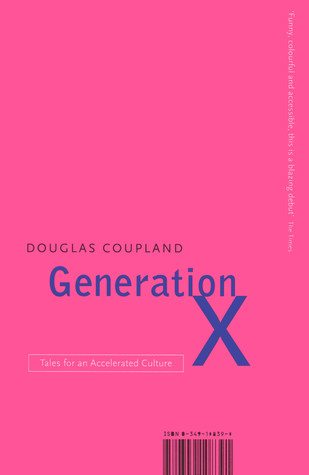
Generation X
Generation X is Douglas Coupland’s acclaimed salute to the generation born in the late 1950s and 1960s–a generation known vaguely up to then as “twentysomething.”
Andy, Claire, and Dag, each in their twenties, have quit “pointless jobs done grudgingly to little applause” in their respective hometowns and cut themselves adrift on the California desert. In search of the drastic changes that will lend meaning to their lives, they’ve mired themselves in the detritus of American cultural memory. Refugees from history, the three develop an ascetic regime of story-telling, boozing, and working McJobs–“low-pay, low-prestige, low-benefit, no-future jobs in the service industry.” They create modern fables of love and death among the cosmetic surgery parlors and cocktail bars of Palm Springs, disturbingly funny tales of nuclear waste, historical overdosing, and mall culture.
A dark snapshot of the trio’s highly fortressed inner world quickly emerges–landscapes peopled with dead TV shows, “Elvis moments,” and semi-disposable Swedish furniture. And from these landscapes, deeper portraits emerge, those of fanatically independent individuals, pathologically ambivalent about the future and brimming with unsatisfied longings for permanence, for love, and for their own home. Andy, Dag, and Claire are underemployed, overeducated, intensely private, and unpredictable. Like the group they mirror, they have nowhere to assuage their fears, and no culture to replace their anomie.
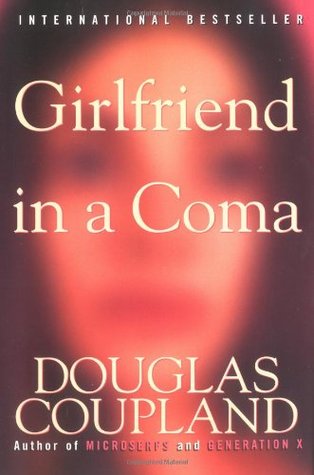
Girlfriend in a Coma
‘What did Karen see that December night? What pictures of tomorrow could so disturb her that she would flee into a refuge of bottomless sleep? Why would she leave me?’
It’s 15 December, 1979, and Richard’s girlfriend Karen has entered a deep coma. She only took a couple of valium washed down with a cocktail, but now she’s locked away in suspended animation, oblivious to the passage of time. What if she were to wake up decades later – a 17-year-old girl in a distant future, a future where the world has gone dark?
And then I felt sad because I realized that once people are broken in certain ways, they can’t ever be fixed, and this is something nobody ever tells you when you are young and it never fails to surprise you as you grow older as you see the people in your life break one by one.
As the expression goes, we spend our youth attaining wealth, and our wealth attaining youth.
In the end, I think the relationships that survive in this world are the ones where two people can finish each other’s sentences. Forget drama and torrid sex and the clash of opposites. Give me banter any day of the week.
I don’t deserve a soul, yet I still have one. I know because it hurts.
Remember: the time you feel lonely is the time you most need to be by yourself. Life’s cruelest irony.
I don’t think anyone ever gets over anything in life; they merely get used to it.
Eroticize intelligence.
